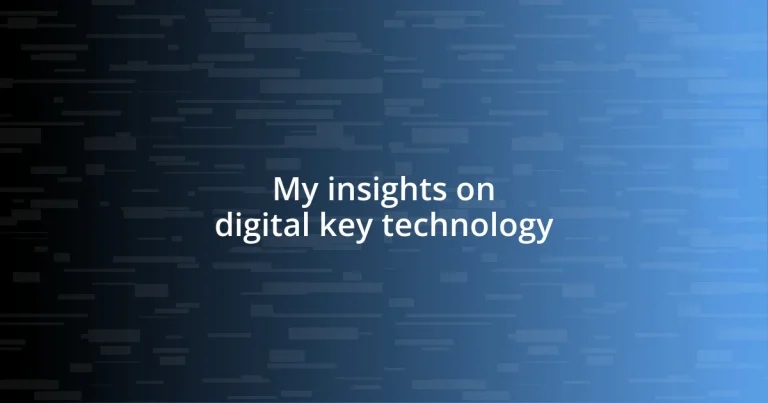Key takeaways:
- Digital key technology enhances convenience and security by allowing access through smartphones via Bluetooth and NFC, eliminating the need for physical keys.
- Key security features such as encryption, two-factor authentication, and remote access control ensure protection against unauthorized entry and add peace of mind for users.
- The integration of digital keys with smart home systems empowers users with flexible access management and the ability to grant temporary access effortlessly.
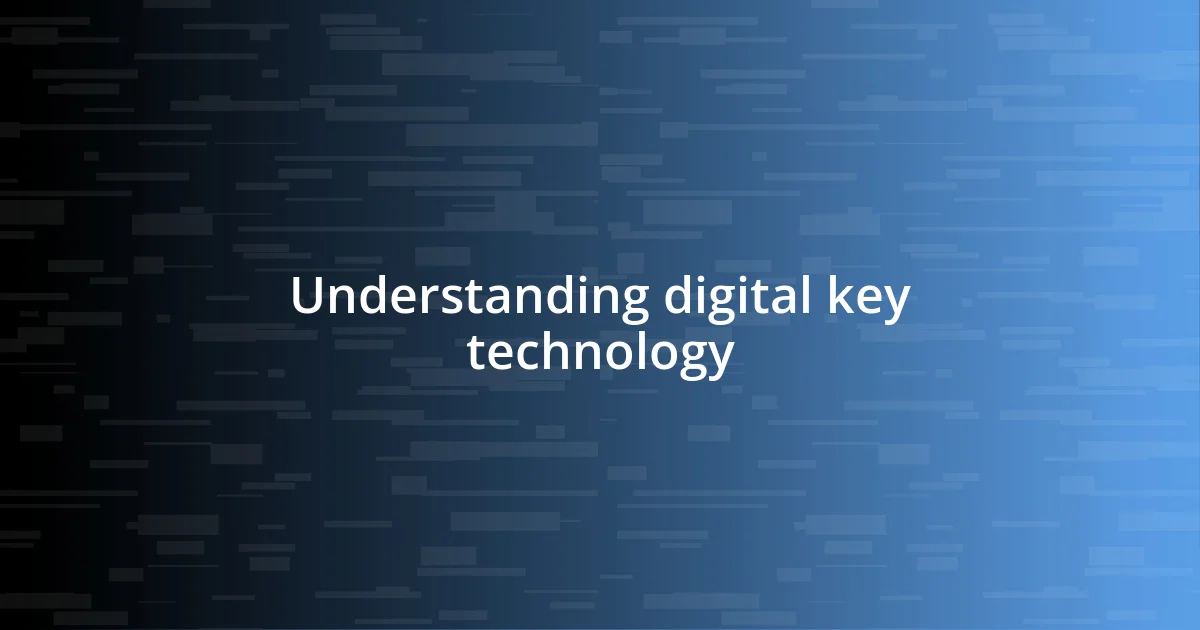
Understanding digital key technology
Digital key technology might seem like a small step in the evolution of security, but it’s actually a giant leap forward. I still remember the first time I used a digital key for a hotel room—no more fumbling with cards, just a quick tap on my smartphone. How liberating is it to know that I don’t have to worry about losing a physical key anymore?
At its core, this technology utilizes Bluetooth and NFC (Near Field Communication) to communicate between your device and the lock. Think about that—your phone becomes your gateway, allowing you access with just a simple touch. This level of convenience is something I didn’t know I was missing until I tried it; it feels almost futuristic. Have you ever pondered how our reliance on physical keys once felt so secure, yet now we see that digital keys offer a more elegant solution?
Moreover, the added layer of security that comes with digital keys is truly compelling. They can easily be deactivated if lost, and you can even grant temporary access to friends or family through apps. I often find myself amazed by how technology evolves to meet our needs—it’s almost like having a personal concierge at my fingertips. Can you imagine a time when we’ll look back and think that carrying around keys was the norm?
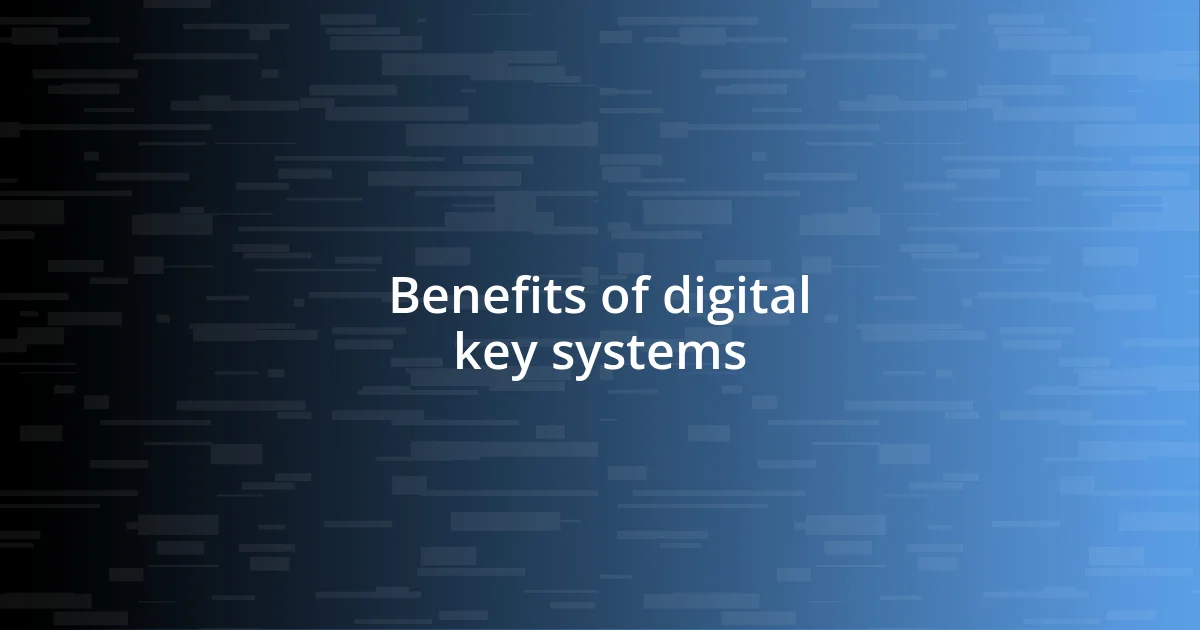
Benefits of digital key systems
Switching to digital key systems has completely transformed the way I think about convenience. I vividly recall an instance when I was out hiking and returned to my cabin only to realize my hands were full. With a simple tap on my phone, I accessed my room without digging through pockets or bags. It was such a game-changer! Imagine enjoying activities without the worry of carrying physical keys.
Security is another crucial aspect that instantly stands out to me. I used to feel nervous about losing a key and the potential for it to be misused. With digital keys, there’s peace of mind knowing that if I lose my phone or it gets stolen, I can easily deactivate the key remotely. This ability to control access is wildly liberating! Plus, the option to grant temporary access to guests through my phone feels incredibly modern; it’s like I have my own digital front desk.
Lastly, let’s talk about the integration with smart home technology. I recently installed smart locks that work seamlessly with my digital keys. It’s exhilarating to enter my home without fumbling for a key, and I can even set up schedules for when family members can come in. This convenience is fantastic—every time I walk through the door, I feel an immediate sense of relief, as if I’m stepping into a tech-savvy sanctuary.
| Benefit | Traditional Keys |
|---|---|
| Convenience | Fumbling with keys |
| Security | Risk of losing keys |
| Access Control | Physical lock changes |
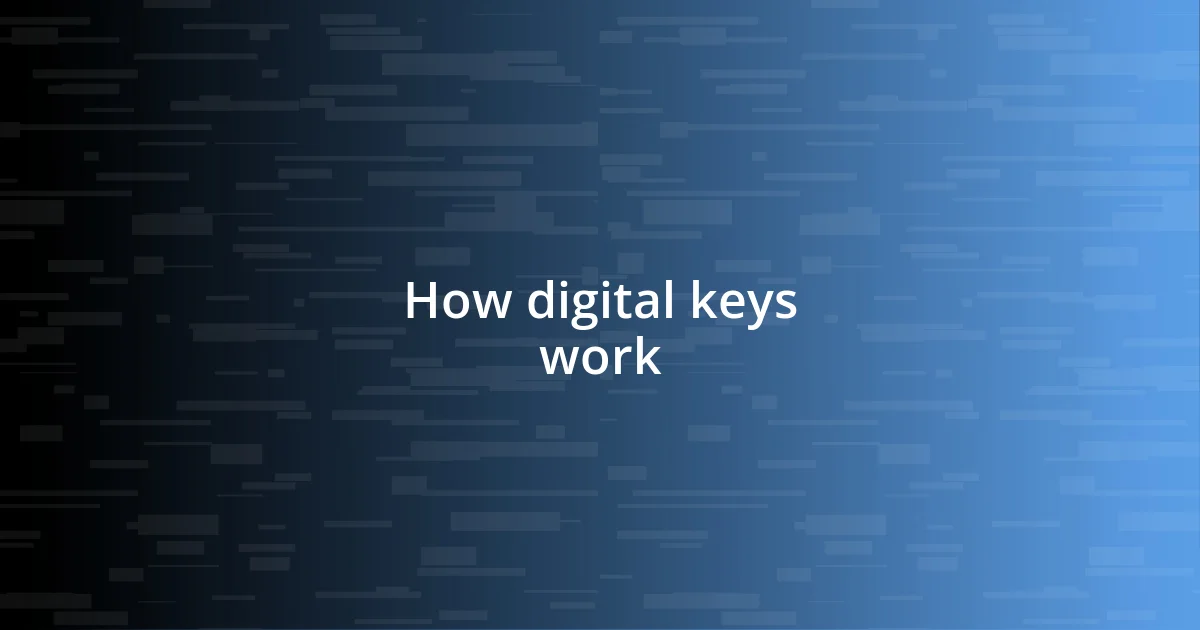
How digital keys work
The mechanics behind how digital keys work are quite fascinating. Essentially, they rely on secure communication protocols, using technologies like Bluetooth and NFC to unlock doors. I remember the first time I approached a smart lock, phone in hand, feeling a swirl of anticipation. With a simple touch, I felt like I was part of a sci-fi movie—access granted without the awkwardness of fumbling for a key. This interaction relies on unique encrypted signals that ensure only authorized devices can unlock the doors, making it both innovative and secure.
Here’s a brief overview of how digital keys operate:
- Bluetooth and NFC: They communicate wirelessly between your smartphone and the lock.
- Encryption: Each interaction is encrypted to prevent unauthorized access.
- Real-time Access Control: Some systems allow you to create temporary digital keys for guests.
- Remote Management: You can unlock doors remotely via an app on your phone.
Technology has a way of making life more manageable, don’t you think? Whenever I step into a space using just my phone, it’s a reminder of how far we’ve come in marrying convenience with security.
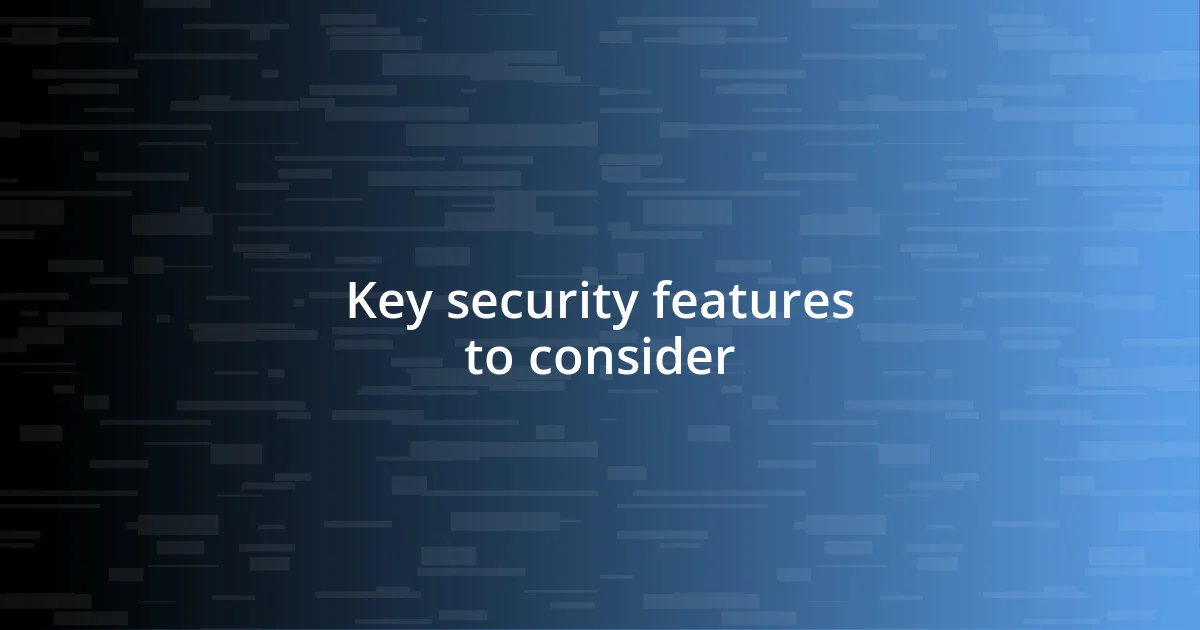
Key security features to consider
When considering key security features in digital key technology, encryption stands out as a top priority. I once had a friend who experienced a breach in her security when hackers managed to intercept her unencrypted digital communications. It was a wake-up call for me; I personally ensured that my digital keys use strong encryption methods. This ensures that even if someone attempts to gain access, they would face layers of sophisticated security—now that’s what I call peace of mind!
Another feature that really resonates with me is two-factor authentication (2FA). I vividly remember setting it up on my digital key app; it felt like adding an extra layer of protection around my home. It requires not just my phone, but also a second factor, like a unique code sent my way, before granting access. This added measure not only secures my physical space but also reassures me that I’m in control. It’s fascinating how much technology can amplify security, isn’t it?
Finally, I can’t help but mention the importance of remote access control. I once found myself at work, in the middle of a meeting, when I realized I’d left my door unlocked. A quick glance at my phone reassured me—I could lock it from anywhere! Knowing that I have the ability to manage access and lock my home on the fly transforms how I think about security. With a simple tap, I can nearly be everywhere in spirit, closed off from unauthorized entry. It’s this flexibility and responsiveness that truly enhance my sense of safety.












